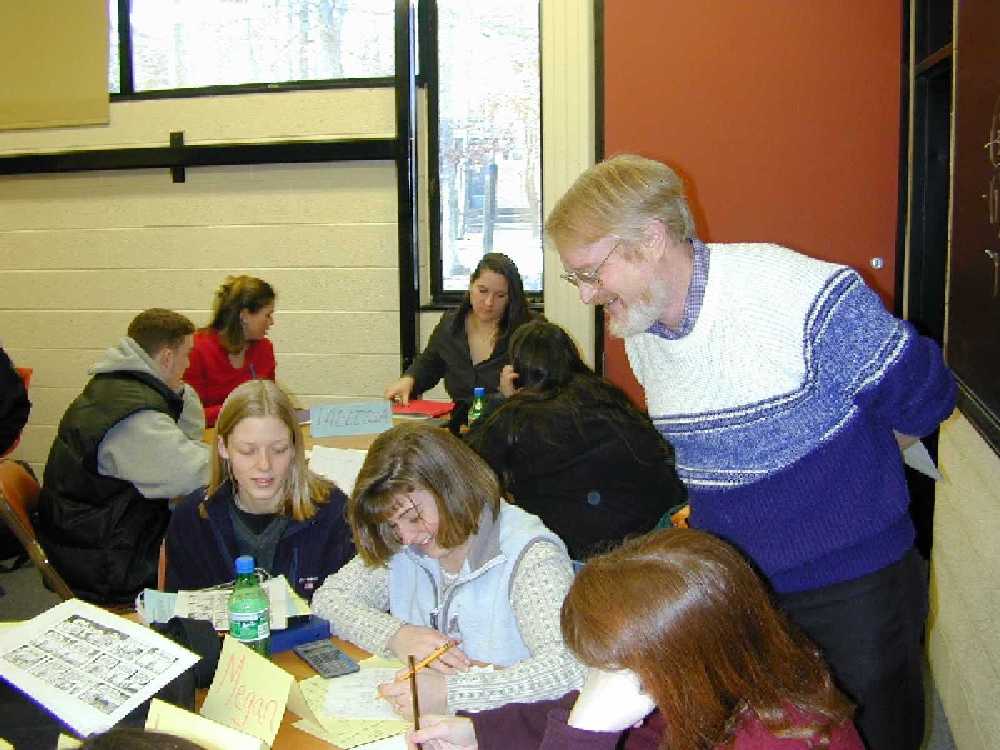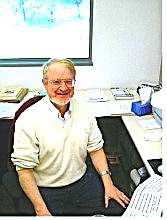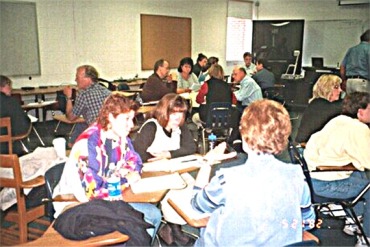

Dr.
Theodore (Ted) Panitz
HAVE WORKSHOPS- WILL TRAVEL
Cape Cod Community
College,
508-362-2131 x4421
2240 Iyannough
Rd., e-mail
home: tpanitz@capecod.net
W. Barnstable, MA
02668
e-mail work: tpanitz@capecod.edu
home phone 1-508-428-4787
http://home.capecod.net/~tpanitz
Education
EdD- Doctor of
Education-
Boston University School of Education 1982
Community College and Adult
Education Department-
specialty- Interactive/Collaborative Approaches to Teaching and Learning
-Adult education
PhD- Comprehensives and Coursework completed- Chem. Eng. IIT 1972
MS- Chemical Engineering- Illinois Institute of Technology 1970
BS- Bachelor of
Chemical Engineering-
Cornell University 1968
Employment history
1976-present - Cape Cod Community College, W. Barnstable, MA
Professor of Mathematics and
Engineering (1976-present);
Mathematics Dept. Chair (2008-present);
Developmental Mathematics Coordinator (1999-2004);
Engineering Science and Technologies
Chairperson (1976-1998)
related activities:
New England Mathematics Association of Two Year Colleges-NEMATYC
President 1998-99, Vice President & program Chair1997-98, Membership Chair
1999-2005
New
Forums Press- Senior Editor for the "Journal of Student-Centered
Learning" and Student
Centered Learning book series, Jan. 2002-2006
1974-1976-
Parkersberg Community College,
Parkersberg, W.Va.
Environmental Technology program
coordinator
Laboratory Technology program
coordinator
1972-1974- E.I.
Dupont Co. , Parkersberg, W.Va.
Environmental Engineer and Process
Engineer-
1968-1972-
Illinois Institute of Technology, Chicago,
ILL.
Chemical Engineering Instructor
Workshops Presented
Lilly-
New England- Conference on Teaching Excellence
sponsored by the International Alliance For Teaching Scholars-
September1995- "Sharing Ideas
On Cooperative Learning", a 1 hour interactive workshop
for college teachers and administrators
September 1996- Opening plenary session- "Studying Cooperative Learning by
Doing Cooperative Learning"
September 1997- "A Look At
The Changing Nature Of College Students And The Implications
For Improving Student Retention". Collaborative workshop
September 1998- "Is
cooperative Learning Possible 100% Of the Time In College Courses?",
AMATYC- American
Mathematical Association of Two Year Colleges- Annual meetings
1997- "Using cooperative
learning in math classes to foster critical thinking and make math
fun", Atlanta,
1998- "Combining cooperative
learning and writing across the curriculum enhances student
learning", Portland OR,
2000- "Profiling Freshmen
Students helps Faculty Develop Retention programs", Chicago, IL
2001- "Comparing standards
based HS exit tests to the Acuplacer college placement test",
Toronto, CANADA,
2004- "Teaching Math Using the 7 Principles of Good Undergraduate Education", Orlando FL
NEMATYC-New England
Mathematical Association for Two Year Colleges, Annual meetings
Interactive workshops for Community College Teachers
1990- "Cooperative Learning
in Mathematics- What Do We Cooperate About"
1991- "Writing Across the
Curriculum-What to Write About In Math?"
1992- "Cooperative Learning
Techniques in Developmental Math Courses"
1993- "Combining Writing In
Math and Cooperative Learning"
1997- "Writing in Math
Answers the Eternal Question: 'What do I need math for?"
1998- "Can Cooperative
Learning Be Used 100% Of the Time In Math Classes?"
1998- Facilitated plenary
sessions- "What problems are we dealing with at the Developmental Math
level and how are we dealing with them?"
1999- "Sharing ideas on
making math classes student centered"
2000- "Cooperative learning CAN do it all!"
2000- Facilitated plenary session- "What do we expect from our
students in specific math courses:
Developmental through Calculus, Statistics, Finite math.
2001- "Comparing the State K-12 MCAS test with the
Acuplacer-College Placement Instrument to identify underlying
assessment philosophies"
2003- "Exploring the 7 Principles of Good Undergraduate Education As a Basis for Improving Student Retention in Math Classes"
Massachusetts Faculty
Development Consortium (MFCD)
1992 regional meeting-
"Cooperative Learning- How to Get Started"
a 2 hour interactive workshop for college teachers
1994 annual meeting-
"Breaking the ice with nervous students"
a 20 minute teaching tips forum
New England Faculty
Development Consortium (NEFD)
1998 annual Fall conference-
"Using Cooperative Learning 100% of the Time in College Courses"
Conference on Mathematics
and Quantitative Thinking- Massachusetts Public Higher Education-
Sponsored by the Urban Collaborative- University Of Mass. Boston
1997- "Writing across the
curriculum-Writing in Mathematics Classes"
1998- "Using Cooperative
Learning 100% of the Time in Math Classes"
1999- "Combining writing and
cooperative learning in math classes"
Consulting
New Hampshire Community and Technical College, Hew Hampshire- Jan 21, 2007 Exploring Cooperative Learning Concepts Through Interactive Cooperative learning Activities, Half day workshop
Southern State Community College, Hillsboro, Ohio, Oct. 31, 2003- Exploring Learning College concepts and the Seven principles of Good Undergraduate Education, using cooperative learning techniques full day workshop given at Southern state Community College (agenda)
Maharishi University of Management- Iowa, August 12, 2002- Using Cooperative Learning Techniques To Explore Problem Based Learning (PBL) Strategies-facilitated full day workshop
Lewis-Clark State College- Faculty Development Day- Lewiston, Idaho-May 22, 2002, Facilitated all day workshop series titled "Applying the Seven Principles of Good Undergraduate Education to Improve At Risk Student Retention, Including Technology Applications" a cooperative learning workshop
Northern Essex
Community College- First Annual Faculty Professional
Day on Teaching
and Learning, Essex, Massachusetts, March 28, 2002, Facilitated
workshop titled
"Using the Seven Principles Of Good
Undergraduate Education to Explore Ways to Improve
Student Performance and retention", a workshop based upon cooperative learning techniques.
Consultant to University
of Illinois Capital Scholars Program,
Springfield Ill, Jan 2001,
Facilitated all day workshops. Theme- Encouraging
Students to Work Cooperatively In and Out of Class
Initiated e-mail discussion group for faculty follow up
Consultant to Bridgewater State College,
Spring 2000- Articulation Task Force-
Served as a Developmental Mathematics consultant
to the High School, Community College,
State College articulation task force
Consultant to New Bedford
School System, New
Bedford, Ma, 1995-1996
Trained teachers
in three Junior High Schools in Cooperative learning techniques.
*Three 2-hour interactive workshops for all school personnel were
completed in the Fall 1995.
Three 2-hour curriculum
development sessions were completed in the Spring 1996
in English, Math, Science and History (12 sessions)
Cape Cod Community
College- Spring 1996-Facilitated two college wide forums on increasing
student retention based upon the questions: "How
has the student profile changed over the past five years?" and "What
can we do to help all our new students succeed?"
Developed an interactive workshop
series which focused upon the nature of our students, what characteristics they
exhibited, how they have changed over the past 5 years, and what actions the
college's personnel could take to help insure student success and retention.
Scheduling courses for success for developmental students, pairing of courses
with career objectives and more support for social services were identified as
having the highest priority.
Sandwich High School- Faculty development day Interactive workshop for primary and secondary school teachers- January 1996 "What is cooperative learning and how do I get started" Worked with teachers from all levels in an interactive workshop which demonstrated all aspects of cooperative learning.
Cape Cod Community College-Spring-Fall 1995- Facilitated forums on Developmental Math "Understanding our students in order to increase student retention in the math program." Four interactive workshops were held over two semesters. Developed a collaborative workshop series which lead to a better understanding of the nature of our students. As a result changes in the math curriculum are being implemented which will improve student success leading to college level math, a math brochure was produced as an advising tool and additional support for our math lab was obtained.
PUBLICATIONS
BOOKS
"Learning
Together: Keeping Teachers and Students Actively Involved by Writing Across the
Curriculum A Source Book of Ideas and Writing Assignments", by Dr.
Theodore Panitz, New
Forums Press: Stillwater, Oklahoma August 2001
http://home.capecod.net/~tpanitz/ewacbook/waccontents.html
Ted's Cooperative
Learning e-book
http://home.capecod.net/~tpanitz/ebook/contents.html
BOOK CHAPTERS
"Benefits of
Cooperative Learning in Relation to Student Motivation", Theodore Panitz,
1999
in Michael Theall
(Ed.) Motivation
from within: Approaches for encouraging faculty and students to excel, in
New directions for Teaching and Learning, n78, Summer 1999 Josey-Bass
publishers: San Francisco, CA, T. Panitz
"Ways To
Encourage Collaborative Teaching In Higher Education", T.
Panitz & P. Panitz, 1998
Chapter #6 in University Teaching:
International Perspectives, James J.F. Forest edition, June 1998, Garland
Publishers
"Will you
be teaching in the twenty-first century?", Theodore Panitz
position paper presented at University of Massachusetts
International,
Interdisciplinary Conference, "Re-organizing Knowledge: Trans-forming
Institutions and the University in the XXI Century" University of
Massachusetts, Amherst, MA, September 17-19, 1999 Published in TOMORROW'S PROFESSOR(SM)
LISTSERV "Desk-top faculty development", A product of the
Stanford University Learning Laboratory
http://sll.stanford.edu/projects/tomprof/home.html
ARTICLES
"Using Cooperative Learning Techniques to Establish a Student-Centered, Interactive Learning Environment", Theodore Panitz, Teaching for Our Times, Partnerships and Collaborations, June, 2004, EdShirley Cassara, published by Bunker Hill Community College, Boston, MA,
"Creating a Student-Centered Learning Environment through Cooperative learning", by Dr. Theodore Panitz, Best Practices in Developmental Education, 2nd Edition, April 2004, Thomas Armington editor, NADE (National Association of Developmental Education) Mathematics Special Professional Interest Network,
"Combining writing and cooperative learning techniques in mathematics", by Ted Panitz, NISOD Innovation Abstracts, Vol XXV number 4, Feb. 2003, National Institute for Staff and organizational Development, College of education, University of Texas at Austin
"The Student Course Portfolio in Mathematics", by Ted Panitz in "The Learning Portfolio: Reflective Practice for Improving Student Learning" by John Zubizarreta 2002, Boston, MA: Ankar Publishing
"Collaborative and Cooperative Learning", Ted Panitz & Dana Christman, Higher Education in the United States: An Encyclopedia, Forest, J., and Kinser, K. Editors, June 2002, Santa Barbara, CA: ABC-CLIO.
"Using Cooperative Learning to Create a
Student-Centered Learning Environment:, Theodore Panitz,
The Successful Professor, Vol. 1, Issue 1, Jan 2002, Simek Publishing:
Millersville, Md.
"Building Study Skills In A Mathematics Classroom" Dr. Theodore Panitz, Sound Instruction: Ready To Use Classroom Practice, Linda Serra-Hagedorn editor, vol 1, May 2001. Rapid Intellect Group: Styvasant Falls, NY
"Cooperative Learning Saves the Day!-- One Teacher's Story", Ted Panitz, Education World, Curriculum Article, http://www.education-world.com/a_curr/curr287a/shtml, Jan 2001
"Will You Still Be Teaching in the twenty-First Century?", Ted Panitz, Humanistic Mathematics Network Journal, Issue #23, September 2000, pp1-16
"Operationalizing Interactive learning paradigms through Cooperative Learning Activities 100% Of the Time In math Classes", Ted Panitz, Humanistic Mathematics Network Journal, Issue #22, April 2000, pp41-43
"Is Cooperative learning Possible 100% of the Time In College
Classes?", Ted Panitz
Cooperative Learning and College Teaching, v9, n2, winter 1999 p13-14
"Is Cooperative learning Possible 100% of the Time In Business
Classes?", Ted Panitz
Marketing
Educator,
v18, n1 Winter 1998-99, p4, p10
"Student Math Autobiography- Math In A Trash Can" , Ted Panitz,
Ontario
Colleges Mathematics Association- OCMA News and Views, Issue99, no.1, Spring 1999 p5-6
"Collaborating In The Classroom", T. Panitz OLS (Open Learning Systems) News Issue 63, March 1998
"Faculty and Student
Resistance to Cooperative Learning", T. Panitz
Cooperative Learning and College Teaching,
vol. 7 No. 2 Winter, 1997
"Why Study Algebra?
Practical Problems Highlight the Value of Mathematics for Stuents"
NCRVE- A Sourcebook for Reshaping the Community College: Curriculum
Integration and the Multiple Domains of Career Preparation Vol. #2- Samples of
Career preparation Innovation MDS-782-vol II, National Center For
Research In Vocational
Education, Univ. of Calif. at
Berkeley
"Collaborative Versus
Cooperative Learning: Comparing the Two Definitions Helps Understand the nature
of
Interactive learning",
T. Panitz Cooperative Learning and College Teaching, V8, No. 2, Winter 1997
"Algebra Anyone" by
Leslie Jones. with introduction by T. Panitz
Humanistic Mathematics Network Journal #15, July 1997
"Ending On A High Note: Better
Endings For Classes And Courses", M. Meier & T. Panitz
College Teaching, Fall 1996
"Assessing Students and Yourself By Observing Students Working Cooperatively and Using the One Minute Paper", T. Panitz, & P. Panitz Cooperative Learning and College Teaching, V6, N3 Spring 1996
"Assessing Students Who Are Working Cooperatively", T. Panitz The problem Log, Volume 1, Issue 2, Fall 1996 Illinois Mathematics and Science Academy's Center for problem Based Learning
"Getting Students Ready
for Cooperative Learning", T. Panitz Cooperative Learning and
College Teaching,
V6, N2 Winter 1996 New Forums
Press, Stillwater, OK
"Group Interactive Approach to Student Assessment", Ted Panitz, Worth A Hoot Newsletter- Sharing Teaching Ideas Among Oregon Institute of technology Faculty. Bright Ideas for Teaching Enrichment. Volume II number 3, April 6, 1995
"How To End Courses With A bang!', Ted Panitz, The Teaching Professor, May 1995, distributed electronically by Magna Publications, 2718 Dryden Drive, Madison WI 53704-3086, USA
" Assessing Student
Learning ( and Yourself) with the One Minute Paper" Ted Panitz
The problem Log, Volume 1,
Issue 1, Spring 1996 Illinois Mathematics and Science Academy's
Center for Problem Based Learning
"Writing in Math",
Ted Panitz, The Lizard Newsletter, Winter 1996, Issue Number 33
Published by the Teaching
Effectiveness Program of the University of Oregon
Community Service
Elected and
appointed positions
Elected to the Barnstable Town
Council 1989-1993
President 1992 & 1993
Vice president 1990 & 1991
Elected to the Barnstable School Committee 1983-1989
Appointed to Barnstable Conservation Commission 1977-1983
Chairman 1981-1983
Appointed Barnstable County Personnel Board Chairman 1985-1986
Elected Barnstable Town Meeting member 1977-1989
Membership in community groups and
organizations
Centerville Civic Association-
president
Cape Cod Energy Education Group
Barnstable Open Space task
Force
Cape Cod mental Health Association Board of Directors
Barnstable Schools Dropout reduction Task Force YMCA
Youth Basketball Coach
Barnstable master Plan Steering
Committee
Barnstable Human Rights task Force- chair
Red Lily Pond reclamation Task
Force
Citizens for Charter Change- chair
Barnstable Conservation
Foundation
Citizens for Long Pond Preservation
Centerville historical
society
WHOI Ocean Discover Museum Committee- chair
Cape and Island Democratic Council
-President Barnstable
Democratic Town Committee - chair
Barnstable Voter Redistricting
Committee
Centerville Historical Society
References
+++++++++++++++++++++++++++++++++++++++++++++++++++++++++++++++++++++++++++++++++++++++++++++
"Hey, listers! When I think of Ted I think of this phrase because he is
an active participant on and
contributor to several math email lists, and that is his standard greeting.
You always know you are
in for some food for thought when you find that greeting on your email.
I am a long-time participant in mathematics organizations - the New England Section of the MAA, the New England Mathematical Association of Community Colleges well as AMATYC itself. I can attest that Ted is an active contributor to math professional development locally and nationally. He is an active and popular participant and contributor at both levels.
Specifically I have seen Ted lead discussion groups on prioritizing
issues in mathematics education.
He does a great job of motivating folks to interact, and of facilitating and
coordinating the process.
If I think of student-centered learning, I think of Ted Panitz. Proselytizer
and practitioner, he is the
person to whom I would turn on this issue or to discuss general math
education issues."
Philip Mahler Professor of
Mathematics
Middlesex Community College
Springs Road, Bedford, MA 01730
+++++++++++++++++++++++++++++++++++++++++++++++++++++++++++++++++++++++++++++++++++++++++++++++
I have attended many of Ted's workshops and have
worked with him extensively in the area of
developmental mathematics. Ted has facilitated
workshops on 'The New CCCC Student.' These
workshops were designed for faculty to help
describe some of the changes in the new students coming
to college and to develop strategies to help
them succeed. Ted did an excellent job of facilitating this
workshop. He uses a highly interactive
participatory approach and is very good at getting people to
express their opinions, concerns and questions.
He helped faculty come up with some excellent ideas
for improving student success.
I also have participated in Ted's workshop on
Cooperative Learning which he presented at the
New England Mathematics Association of Two Year
Colleges (NEMATYC) Conference. He did
a great job of tailoring this presentation to
fit the audience--in this case developmental mathematics
faculty. Ted is very articulate himself, but his
real strength is in creating an interactive
learning/discussion environment in which all
feel comfortable participating."
Dave Ziemba
Assistant Dean, Advising and Counseling
Cape Cod Community College
++++++++++++++++++++++++++++++++++++++++++++++++++++++++++++++++++++++++++++++++++++++++++++++++
"Ted has the ability to share his vast
knowledge of collaborative learning with other faculty through
exercises that get faculty to experience for
themselves how the collaborative process works. Ted's
workshops are highly interactive. His sense of
humor and ability to get faculty involved make
learning about the collaborative process both
fun and meaningful."
Bruce Bell
Associate Academic Dean, Art and Sciences
Cape Cod Community College
++++++++++++++++++++++++++++++++++++++++++++++++++++++++++++++++++++++++++++++++++++++++++++++++++
Home (return to the index)
